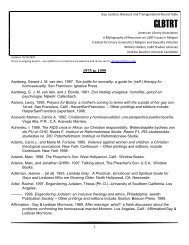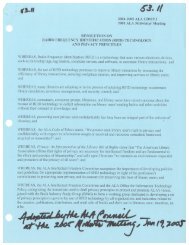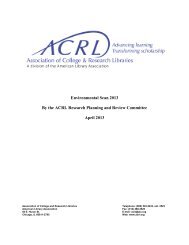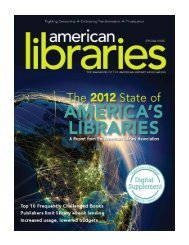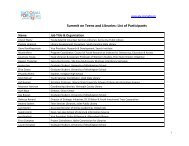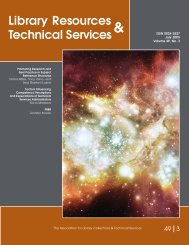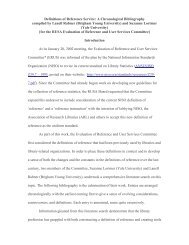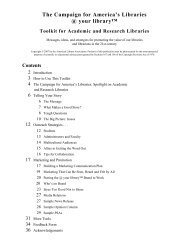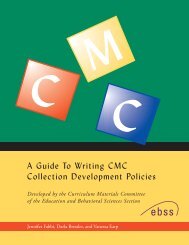Toolkit for School Library Media Programs - American Library ...
Toolkit for School Library Media Programs - American Library ...
Toolkit for School Library Media Programs - American Library ...
You also want an ePaper? Increase the reach of your titles
YUMPU automatically turns print PDFs into web optimized ePapers that Google loves.
cherished when they were that age. The discussion<br />
continues as each generation explains what has<br />
caused the changes in their lives, especially in<br />
regards to entertainment and social life. A<br />
PowerPoint presentation of the experience will be<br />
the culminating event when both groups come<br />
together to meet and talk face to face. (Contact:<br />
Michele Petrosky, chlesfaeriedust@aol.com)<br />
Good communication is key to successful<br />
collaboration<br />
Some tips:<br />
● Use collaboration as an opportunity to educate about<br />
what you do. Don’t assume that others (including<br />
other librarians) know what you have to offer.<br />
● Do your homework. Don’t assume you know what<br />
others have to offer. Be aware of any laws, school<br />
district or other policies that may apply.<br />
● Be patient and persistent. Scheduling and details can<br />
be challenging when working with many parties.<br />
● Make sure your principal and teaching staff are aware<br />
of the nature of the collaboration and the reasons<br />
behind it. Invite their input. Provide updates.<br />
● Get to know the people you are working with. Invite<br />
them <strong>for</strong> coffee or lunch.<br />
● Confirm goals and expectations in writing <strong>for</strong> all<br />
contributors.<br />
● Make certain that everyone receives regular updates and<br />
has input in the publicity and reporting <strong>for</strong> the project.<br />
● Build in an evaluation process.<br />
● Be sure to thank everyone involved. Provide a<br />
summary of what was accomplished.<br />
Contributors: M. Veanna Baxter, adjunct professor, <strong>Library</strong><br />
Science and In<strong>for</strong>mation Technologies, Mansfield University,<br />
Mansfield, PA; principal of VBEC <strong>Library</strong> Consulting<br />
Services. A school librarian <strong>for</strong> 30 years, Baxter is immediate<br />
past president of the Pennsylvania <strong>School</strong> Librarians<br />
Association (PSLA). Susan Gilbert Beck, president of Emanda,<br />
Inc. and a consultant on access. For more in<strong>for</strong>mation, see:<br />
The <strong>School</strong> Buddy System: The Practice of<br />
Collaboration, Gail Bush. Chicago: <strong>American</strong> <strong>Library</strong><br />
Association, 2002.<br />
Collaboration: Lessons Learned, Robert Grover, ed.,<br />
<strong>American</strong> Association of <strong>School</strong> Librarians, 1996. To<br />
order call 866-SHOP ALA (866-746-7252).<br />
17<br />
Working with <strong>School</strong><br />
District PR Staff<br />
Many school districts (and some schools) employ<br />
communications/public relations professionals who can<br />
advise and assist you with your marketing plans,<br />
especially outreach to the media and community.<br />
The district-level communication/PR office generally acts<br />
as a clearinghouse <strong>for</strong> anything related to the media—<br />
news releases, letters to local newspapers, radio or<br />
television interviews. Its staff are often looking <strong>for</strong> “good<br />
news” stories to share with the media—not just about<br />
teachers and students, but also your professional<br />
activities and achievements.<br />
In working with communication/PR staff, the same<br />
guidelines apply as to other types of collaboration.<br />
Because their services are often heavily in demand, it is<br />
especially important to:<br />
● Follow the communication policies and guidelines<br />
they provide.<br />
● Use the <strong>for</strong>ms provided <strong>for</strong> a parent or guardian to<br />
grant permission <strong>for</strong> student photos and comments<br />
to appear in the news media.<br />
● Build and nurture relationships with key staff.<br />
● Keep them in<strong>for</strong>med of library activities.<br />
● Know what they can and can’t do.<br />
● Meet their deadlines.<br />
● Let them know you appreciate their services.<br />
In some districts, school staff are not allowed to create<br />
their own promotional materials but are required to use<br />
district staff. Providing the professionally designed and<br />
ready-to-use @ your library ® logo and campaign<br />
materials can make their jobs easier.<br />
If your district or school does not have communication<br />
expertise, you may wish to recruit a parent or other<br />
volunteer with this expertise. Promoting the library<br />
might also make <strong>for</strong> an intriguing class project.<br />
Contributor: Harriet Selverstone, an adjunct visiting professor<br />
at Pratt Institute’s Graduate <strong>School</strong> of In<strong>for</strong>mation and<br />
<strong>Library</strong> Science. She is a past president of the <strong>American</strong><br />
Association of <strong>School</strong> Librarians.



